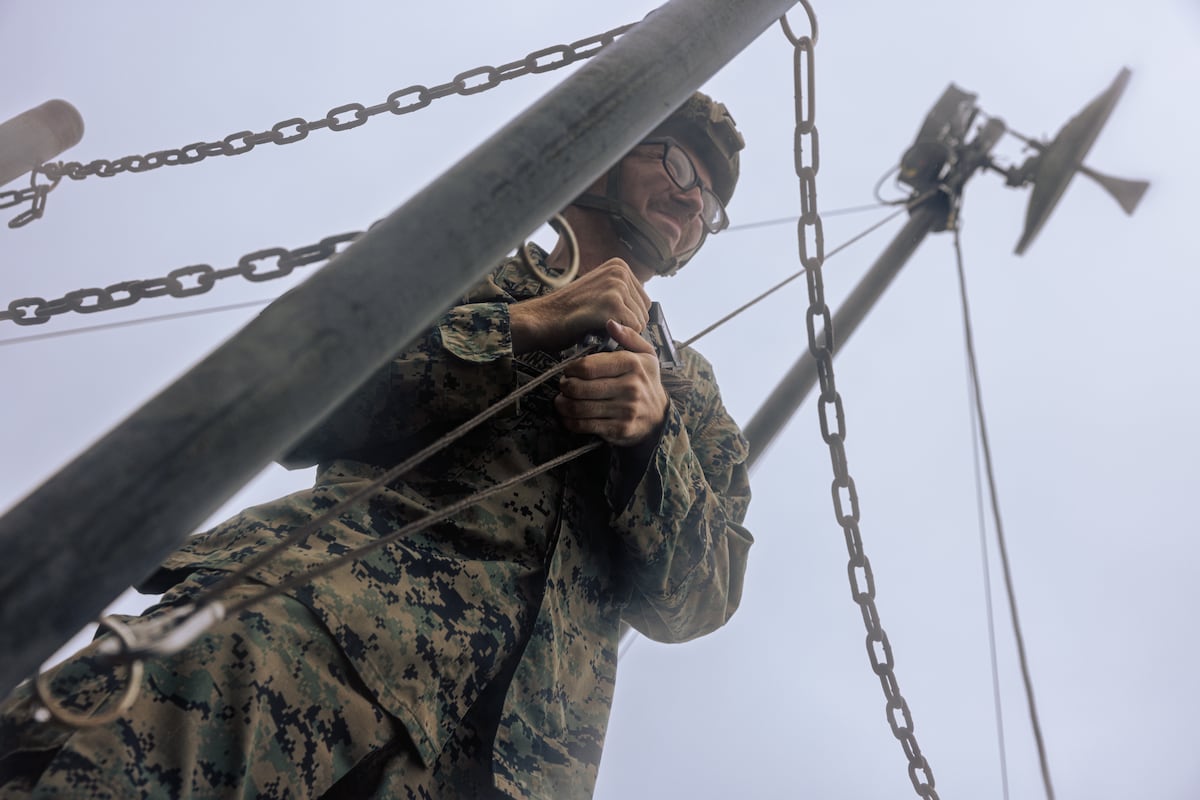The Marines’ Pacific-based information group conducted a “first of its kind” training operation to extend communications, reconnaissance and targeting across wide swaths of the region.
The III Marine Expeditionary Force Information Group recently completed Exercise Kaiju Rain 25 on May 12. The exercise combined joint, interagency and allied partners with a focus on cyber operations, electronic warfare and multi-domain sensing for distributed operations, according to a Marine Corps release.
“Each of the battalions encompasses a warfighting capability within information,” said Col. Joshua Mayoral, commanding officer of III MIG. “Bringing the capabilities together as a III MIG team, as an information combat element, projects the aggregated and integrated C5ISRT and counter-C5ISRT capability that enables joint and coalition command and control (C2) and kill webs, and long-range precision fires.”
Marines used the All Domain Operations Center, which served as III MIG’s central hub for analyzing and synthesizing information gathered across their area of operations.
Battalions collected data and signals through sensing, surveillance and electronic warfare. Those were then passed to the ADOC, where they were fused into a coherent operational picture, according to the release.
This method of centralized processing allowed for faster decision-making and enabled the command elements to coordinate effects across domains in support of distributed operations.
“Kaiju Rain 25 is the first of its kind rehearsal led by III MEF Information Group to test and refine Marine Corps communications, sensing and coordination capabilities across all domains, to include sea, land, air and cyberspace,” said Gunnery Sgt. Andrew Ogletree, the ADOC Cognitive Cell chief.
The 3rd Intelligence Battalion handled sensing and conducted sensor fusion to support targeting operations, according to the release. That allowed for the development of the kill web by integrating multi-domain intelligence for timely, precise engagements.
“We are able to operate in any environment — whether it’s austere or more developed. With all of our equipment being man-packable, we are able to go to any point on the globe,” said Cpl. Aidan Henson, the Maritime Support Team lead with 3rd Intelligence Battalion.
RELATED
The 3rd Radio Battalion provided signals intelligence and electronic warfare capabilities to send data to the ADOC, which enabled enhanced sensing, targeting and operational decision-making. Marines used the battalion’s Automated Parachute System for insert and extract missions, reinforcing their role in enabling rapid, responsive operations.
“On the ground level, we are the ones receiving those signals, doing that collection and analysis, and as intel becomes more and more important, it’s passed along to those at III MIG that really need it,” said Cpl. Michael Redding, a signals intelligence and electronic warfare team lead with 3rd Radio Battalion.
The 5th Air Naval Gunfire Liaison Company enabled cross-domain fires through forward-deployed, sensor-enabled Marines. One such example was their small drone team, which enhanced precision targeting and kill chain integration.
The same unit concurrently participated in multiple war-fighting functions through its unit-level exercises, Katana Strike and Ryukyu Hammer.
The 7th Communication Battalion “established expeditionary command and control nodes and delivered resilient mobile communications in support of Kaiju Rain 25,” the Marine Corps release said.
That work helped integrate communications, intelligence, command and control and targeting capabilities across the battlespace. The battalion also conducted unit-level training as part of Triad Thunder.
“We are in an information age, and right now with modern technology, information is one of the fastest moving things on Earth,” said Ogletree. “Whoever controls the flow of information will control the fight.”
Todd South has written about crime, courts, government and the military for multiple publications since 2004 and was named a 2014 Pulitzer finalist for a co-written project on witness intimidation. Todd is a Marine veteran of the Iraq War.
Read the full article here








